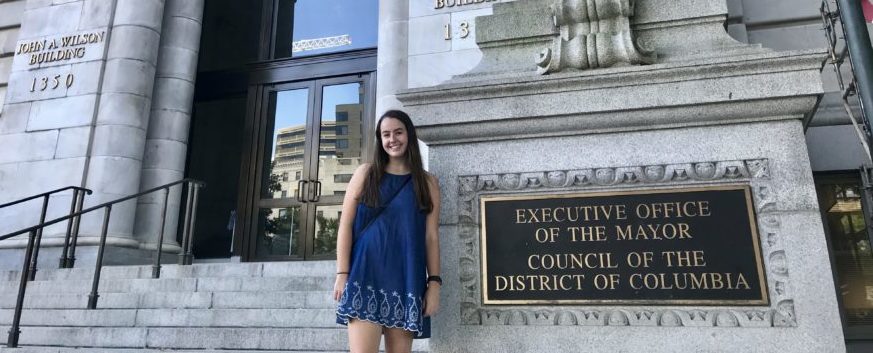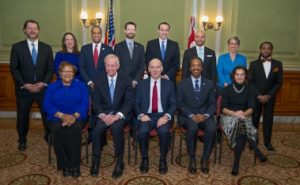
During the Fall of 2017 I had the opportunity to spend the semester in Washington DC with 16 Wake Forest students. I taught two political science courses on law and policy, and the students interned four days a week with various governmental and non-governmental organizations.
In an earlier post I wrote about the potential for internships to provide important civic lessons as well as providing the development of professional skills and experience. Two of the students worked for Councilwoman Mary Cheh on the DC Council, giving them the unique opportunity to experience local government in the unusual context of the national capital. I asked Abigail McLean (pictured above) one of those students, to reflect on her experience. Abigail, who will graduate in May, was recently hired by Councilwoman Cheh’s office to serve on her staff.

What interested you about this particular internship opportunity?
Abigail: The year before my internship at the D.C. Council, I interned for a congressional office on Capitol Hill. I really enjoyed this experience, but one of the things that frustrated me was the speed at which legislation moved. I could spend several days working on a project, only to never see or hear anything about it again because it simply takes so long to move legislation through. Since the D.C. Council is a smaller governing body in charge of a much smaller jurisdiction, I knew that I could contribute more to the legislative process and experience more firsthand.
Can you describe for us what your responsibilities were for the internship?

Abigail: One of my regular tasks was to gather “press clips” every day. I would search the internet and local publications for articles that were relevant to the Councilmember that I was working for, legislation we were working on, and the D.C. Council in general. This would then be circulated to all the staff in the office so everyone was up to date on the latest news. I also helped several staff members research policy ideas. We would often look to similar jurisdictions (usually cities, because they are comparable in size), and find out what kind of approaches they were taking to issues we were working on.
What project or projects did you find most interesting and why?
Abigail: One project that I worked on throughout the semester related to the Cleveland Park neighborhood.

There had recently been a lot of turnover in businesses in this neighborhood, and our office wanted to look into what possible policies could help avoid this. It was a complicated issue because the real estate in the neighborhood is very valuable, and some of the facades of the buildings were protected by historical preservation laws. Because of this, only certain types of businesses could make the space work for them. We tried to gather as much input from the community as possible and came up with ideas that would protect the businesses that we wanted to protect. I really enjoyed working on this project because I got to see how the community was directly affected by actions the Council would or would not take.
What was it like to work for a local government in the heart of the nation’s capital? What insights did you gain about local government, both as to its contributions to the democratic process and its challenges?
Abigail: One unique challenge that the D.C. Council faces is that Congress has a lot of control over the District’s local affairs. Any bill that the Council passes can be rejected by a vote in Congress. Because of this, several major bills have been held up or altered even after being agreed upon by the Council. For example, the possession of marijuana is legal in the District, but because of Congress’s interference, it is illegal to buy or sell it. Even with these challenges, I found local government very rewarding to work in because problems can often be solved much more quickly than they would be on a national level.
Did your internship provide any insights for you about citizenship and civic engagement, that you might not have learned otherwise?
Abigail: An important lesson that I took from my internship experience was that organizations are very important to the civic engagement process. A group of citizens, each representing themselves, can be effective, but they can be much more effective if they join together and form an organization based on a common cause that they all believe in. They can be especially effective if they are known in the community and to the members of the government.
What was the most important thing you learned from this internship experience?
Abigail: Local government is extremely important to people’s everyday lives, and most people take it for granted. The government takes care of so many issues and services that most people don’t even think about on a daily basis. Additionally, the laws and regulations that the local government passes probably affect your life more than national laws, even though the national ones get much more media attention.
If local governments want to have college students as interns, what advice would you give them for maximizing the benefit of the internship for both the intern and the employer?
Abigail: Something that I really enjoyed in my internship was getting to work on a variety of tasks. I helped several different staff members with what they were working on, and as a result, I came away with a well-rounded idea of everything that the office deals with on an everyday basis. I would highly recommend that local governments use their interns in a variety of capacities so that the intern can be a help to many people in the office and find an issue area that they are passionate about working on.